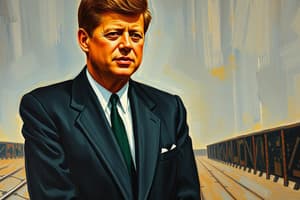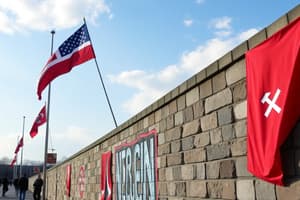Podcast
Questions and Answers
Which of the following was a key foreign policy strategy of Dwight Eisenhower during the Cold War?
Which of the following was a key foreign policy strategy of Dwight Eisenhower during the Cold War?
- Isolationism
- Brinkmanship (correct)
- Containment
- Détente
What was a significant action taken by John F. Kennedy during the Cuban Missile Crisis?
What was a significant action taken by John F. Kennedy during the Cuban Missile Crisis?
- Implementing a naval blockade (correct)
- Establishing military bases in Turkey
- Invading Cuba
- Negotiating a peace treaty
Which legislation is associated with providing benefits for returning World War II veterans?
Which legislation is associated with providing benefits for returning World War II veterans?
- Fair Labor Standards Act
- Civil Rights Act
- Social Security Act
- G.I. Bill of Rights (correct)
Which amendment lowered the voting age to 18 in the United States?
Which amendment lowered the voting age to 18 in the United States?
What landmark decision did the Supreme Court make in Brown vs. Board of Education?
What landmark decision did the Supreme Court make in Brown vs. Board of Education?
Which of the following was NOT a goal of the Civil Rights Movement?
Which of the following was NOT a goal of the Civil Rights Movement?
What was a primary feature of the Great Society program initiated by Lyndon Johnson?
What was a primary feature of the Great Society program initiated by Lyndon Johnson?
What was the main result of the Watergate incident?
What was the main result of the Watergate incident?
What was the primary significance of the Iran hostage crisis?
What was the primary significance of the Iran hostage crisis?
Which of the following individuals is best known for their role in advancing civil rights through nonviolent protest?
Which of the following individuals is best known for their role in advancing civil rights through nonviolent protest?
Flashcards
United Nations
United Nations
An international organization formed after World War II to maintain peace and security, promote international cooperation, and develop friendly relations among nations.
Marshall Plan
Marshall Plan
A US program that provided economic aid to war-torn European countries after World War II to help rebuild their economies and prevent the spread of communism.
Truman Doctrine
Truman Doctrine
A US foreign policy that provided military and economic aid to countries threatened by communist expansion.
NATO
NATO
Signup and view all the flashcards
Cold War
Cold War
Signup and view all the flashcards
Eisenhower's Foreign Policy
Eisenhower's Foreign Policy
Signup and view all the flashcards
Great Society
Great Society
Signup and view all the flashcards
Vietnam War
Vietnam War
Signup and view all the flashcards
Watergate Scandal
Watergate Scandal
Signup and view all the flashcards
Civil Rights Act of 1964
Civil Rights Act of 1964
Signup and view all the flashcards
Study Notes
Lesson 8: Cold War and Kennedy Administration
- Describe the United Nations and its three main divisions.
- Explain how the Marshall Plan, Truman Doctrine, and NATO deterred communist advancement.
- Detail the benefits of the GI Bill of Rights.
- Define the Cold War and Dwight Eisenhower's key foreign policy strategy.
- Note the key features of 1950s culture.
- Explain Truman's role in assisting African-Americans.
- Summarize the achievements of Lee Harvey Oswald, Fidel Castro, and Neil Armstrong.
- Detail Kennedy's actions regarding the Cuban Missile Crisis.
- Explain Kennedy's inaugural statement and its meaning.
Lesson 9: Johnson and Nixon Administrations
- Identify: Lyndon Johnson, Robert C. Weaver, War Powers Act, and the 26th Amendment.
- Identify the Great Society.
- State the Supreme Court's ruling in Miranda v. Arizona.
- Discuss the Vietnam War in terms of leadership, strategy, military tactics, human and monetary resources, protests, and ending events.
- Explain the Watergate incident and Richard Nixon's role.
Lesson 10: Civil Rights Movement
- Identify key figures in the Civil Rights Movement (Stokely Carmichael, Rosa Parks, Thurgood Marshall, Malcolm X, Muhammad Ali, Martin Luther King Jr.).
- Note historic and political firsts achieved by key figures (Carol Moseley Braun, Condoleezza Rice, Colin Powell, Shirley Chisholm, Jesse Jackson, Douglas Wilder, and Barack Obama).
- Explain the Civil Rights Act of 1964 and Affirmative Action.
- Describe the Brown v. Board of Education Supreme Court ruling.
- Identify the SNCC and its role in the Civil Rights Movement.
Lesson 11: Women's Movement, Carter, and World Affairs
- Explain the association of NOW, ERA, and Roe v. Wade with the women's movement.
- Outline Jimmy Carter's achievements concerning the Panama Canal Treaty and Camp David Accords.
- Detail the Iran hostage crisis.
Lesson 12: Presidents Reagan to Obama
- Identify the historical firsts achieved by Sandra Day O'Connor and Madeleine Albright.
- Explain the justifications for the wars with Iraq by George H.W. Bush and George W. Bush.
- Detail the events of 9/11.
- Explain the Reagan Revolution.
- Discuss the impeachment of Bill Clinton and the result of his Senate trial.
- Identify the current president of the United States.
General Study Skills
- Be prepared to read and interpret graphs, charts, maps, and political cartoons.
- Develop the ability to make inferences, draw conclusions, and interpret primary sources.
- Employ other social studies skills.
Studying That Suits You
Use AI to generate personalized quizzes and flashcards to suit your learning preferences.




